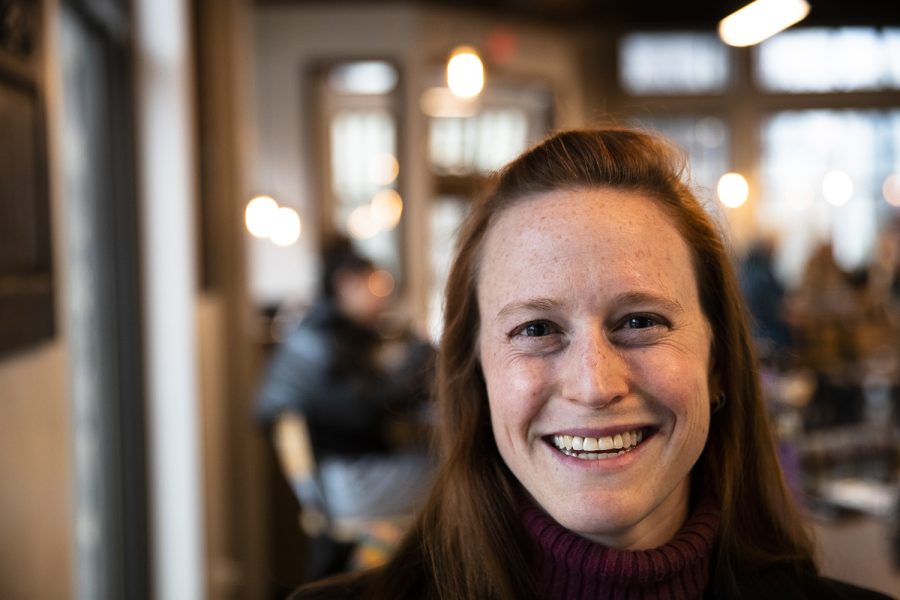Democrat Elinor Levin looking to bring new ideas to Iowa Statehouse
Levin hopes new lawmakers will bring a new energy to the Iowa legislature, which has been in a stalemate for so long, she said.
Elinor Levin, Iowa House of Representative candidate for District 89, poses for a portrait at Encounter Cafe in Iowa City on Friday, Dec. 10, 2021.
December 13, 2021
Elinor Levin had wanted to run for office for several years, and with the retirement of Rep. Mary Mascher, D-Iowa City, who has been in her seat since 1995, Levin says she has found the right opportunity. She is seeking election to Iowa House District 89 as a Democrat in 2022.
“I have been actually talking to Representative Mascher for the past three or four years, just saying, ‘If there’s a time where you’re considering retiring, I’m very interested in this particular level of representation.’ That’s where I feel like I can do the most good,” Levin said.
Another Iowa City legislator, Sen. Joe Bolkcom, D-Iowa City, announced he will also retire after his current term. Rep. Christina Bohannan, D-Iowa City, is running for the U.S. Congress in Iowa’s 1st Congressional District, so she won’t be seeking reelection to her House seat.
Two other Democrats have announced their intent to run for House District 89: University of Iowa student Dylan Harvey, and Iowa City labor leader and activist Tony Currin.
Levin, 34, currently lives in the South District of Iowa City. She grew up in the Chicago suburbs, and she first came to Iowa to attend Cornell College in Mount Vernon. After graduating, she moved to Coralville in 2009 and then to Iowa City in 2010. She and her spouse, a Navy officer, left for five years for her spouse’s work, and then returned to Iowa City five years ago.
RELATED: Rep. Mary Mascher not seeking reelection to Iowa House
Levin has been involved in Iowa City community groups such as the Iowa City Community Theatre, League of Women Voters, and South District Neighborhood Association.
Levin says she is optimistic about the changes happening in Iowa City representation.
“I’m hopeful that new people will come in with new energy and make new relationships and be able to have conversations in a new way,” she said. “Like asking questions that maybe were asked five years ago, but no one’s asked them since then, because it didn’t feel worthwhile.”
RELATED: UI student Dylan Harvey launches Iowa House campaign
Levin also said Bolkcom and Mascher are great resources who will still be available as resources to the people stepping into their roles.
While Iowa City and Johnson County are heavily Democratic, Republicans hold power at the Statehouse. Levin said as a private reading tutor, she has honed communication skills, which she would use to navigate Iowa politics as a member of the minority party, if elected.
“Let’s talk about how this is actually going to benefit or detract from the lives of Iowans,” she said. “And I want to be able to say I really went out there and said what I think is true, and here’s the responses that I got, here’s what I heard from my fellow legislators or from my community or from the people who this is going to impact.”
RELATED: Fresh faces will represent Johnson County in 2023
Levin said she is a people-focused candidate, not policy focused candidate. However, one issue she is concerned about is reproductive rights and the proposed constitutional amendment Iowa legislators passed last year, amending the Iowa Constitution to state it does not protect the right to an abortion. The proposed amendment, which passed once this year, must pass again in 2023 or 2024, and will then be put to a vote.
Levin also wants to reduce gun violence and advocate for safe gun legislation.
She is also concerned about how the Republicans have framed getting rid of the Iowa’s income tax.
“What does that mean? Does that mean increasing the sales tax to 14, 15, or higher percent? Does that mean increasing property taxes? Both of those are regressive taxes,” Levin said. “Both of those are going to hurt working class Iowans far more than they’re going to hurt people who are paying higher income taxes. Income tax is not a regressive tax, it is progressive.”




